Earth Policy Dialogue
Earth Policy Dialogue (EPD) consists of series of seminars, symposiums & conferences, bringing together promising young leaders and leading experts for intergenerational knowledge exchange. The goal is to develop ideas and solutions for ongoing and frontier environmental challenges.

Earth Policy Dialogue: Toward a New ‘Political Settlement’ for the Well-being of People and the Planet
আর্থ পলিসি ডায়ালগ: প্রাণ ও প্রকৃতির কল্যাণে একটি নতুন রাজনৈতিক বন্দোবস্ত
Date: Thursday, October 30, 2025 | Time: 2:00 PM – 4:30 PM
Venue: Muzaffar Ahmed Chowdhury Auditorium, Faculty of Social Sciences Building, University of Dhaka
Bangladesh’s climate and environmental governance are shaped by complex political economy and political ecology dynamics, where power, access, and resource interests often undermine transparency, accountability, and participation. Weak institutional coordination and elite capture constrain effective and inclusive policy implementation. The Earth Policy Dialogue (EPD) will explore how governance reform grounded in openness, civic engagement, and ecological justice can strengthen environmental protection and foster trust among citizens, policymakers, and political actors.
The dialogue also will seek to explore how genuine environmental protection in Bangladesh remains unattainable without sustained political commitment. Despite growing ecological challenges, the discourse on well-being beyond GDP continues to be absent from party priorities and political commitments. The Dialogue therefore aims to bring together academics, policymakers, and political leaders to address this gap and examine how climate and ecological issues can secure stronger political and institutional attention.
Discussions will focus on the political economy and political ecology of Bangladesh’s triple planetary crisis: climate change, biodiversity loss and pollution, alongside the science–policy interface, to identify where urgent and transformative action is needed. Three of Bangladesh’s leading experts will share their analytical insights, while representatives from major political parties will present their environmental visions, commitments, and manifesto priorities.
By fostering dialogue among experts, student leaders, and political representatives, the Department of Public Administration, University of Dhaka in partnership with the Bangladesh Youth Environmental Initiative (BYEI) and BRIDGE – Bay of Bengal Research Institute for Democratic Governance, Economy and Environment, aims to advance accountability, evidence-informed policymaking, and a “beyond GDP” development narrative – one that prioritizes the well-being of both people and the planet. Ultimately, the Dialogue aspires to strengthen Bangladesh’s planetary stewardship and chart a course toward a more just, fair, equitable, and sustainable future for Bangladesh.
Expert Speakers (Invited – TBC)
- Prof. Kazi Maruful Islam, Professor, Department of Development Studies, University of Dhaka; or Prof. Rashed Al Mahmud Titumir, Department of Development Studies, University of Dhaka; and Chairperson, Unnayan Onneshan
- Dr. Ahsan U. Ahmed, Former Member, Independent Technical Advisory Board, Green Climate Fund (GCF), UNFCCC; Executive Director, Center for Global Change; or Dr. Mirza M. Hassan, Advisor, Governance and Politics, BRAC Institute of Governance and Development (BIGD)
- Mr. Shamir Shehab, Curator, Bay of Bengal Research Institute for Democratic Governance, Economy and Environment (BRIDGE) and Adjunct Faculty Member, North South University
Special Guests – Political Party Representatives (Invited – TBC)
- Bangladesh Nationalist Party (BNP): Dr. Abdul Moyeen Khan, Member, Standing Committee; or Dr. Mahdi Amin, Adviser to the Acting Chairperson
- Bangladesh Jamaat-e-Islami: Dr. Hamidur Rahman Azad or Advocate Ahsanul Mahboob Zubair, Assistant Secretary General
- Amar Bangladesh Party (AB Party): Barrister Asaduzzaman Fuad, General Secretary or Mr. Tajwar Quashem, Member, Shadow Affairs Committee
- National Citizen Party (NCP): Dr. Tasnim Jara, Senior Joint Secretary; or Mr Mir Arshadul Hoque, Joint Member Secretary & Chief of Environment Cell
- Gonosamhati Andolon: Mr. Zonayed Saki, Chief Coordinator, Central Committee
- Bangladesh Rashtro Shongskar Andolon: Mr. Hasnat Quaiyum, President
- Dhaka University Central Students’ Union (DUCSU): Mr. Shadik Kayem, Vice President
Guests and Speakers
- Chief Guest: Dr. Hossain Zillur Rahman, Executive Chairmain, Power and Participation Research Center (PPRC)
- Chair: Prof. Syeda Lasna Kabir, Chairman, Department of Public Administration, University of Dhaka
- Remarks: Prof. Musleh Uddin Ahmed, Dhaka University and Former Vice Chancellor, SUST
- Moderator: Prof. Shehreen Amin Bhuiyan, Department of Public Administration, University of Dhaka
***Representatives from all major student political parties at the University of Dhaka, including Bangladesh Chhatra Dal, Chhatra Shibir, Bangladesh Students’ Union, BAGCHAS, and others, will also be invited to share their perspectives.
Solve Lead Pollution: Workshop and dialogue for youth advocates
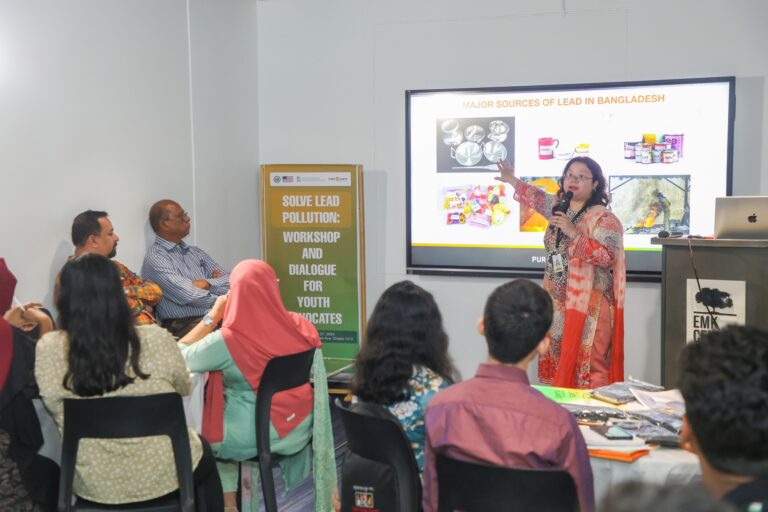
To raise awareness among youth about lead pollution, Pure Earth Bangladesh and Bangladesh Youth Environmental Initiative (BYEI) jointly organized a dialogue.
The event took place on February 27, 2024 at EMK Center in Dhaka, with participation from students of various universities and environmental activists. The workshop was conducted by Mitali Das, Communications Lead at Pure Earth Bangladesh. Dr. Md. Mahbubur Rahman, Project Coordinator at icddr,b, was present as the special guest speaker.
National Youth Consultation Workshop on the Conservation of land, water, and seas: Target 3 of GBF in the context of Bangladesh
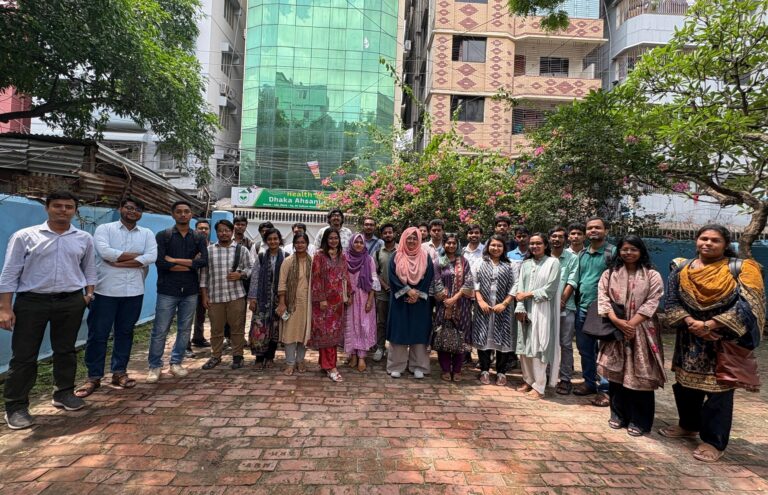
Life in the deltaic ecosystem of Bangladesh is inextricably linked to its rivers, forests and wetlands. Over the past two decades there have been significant losses and degradation of the forests, wetlands, rivers and coastal ecosystems. Bangladesh is committed to achieving Target 3 of the Global Biodiversity Framework (GBF), which aims to conserve at least 30% of terrestrial, inland water, and coastal and marine areas.
In the run-up to the International Day of Biodiversity 2025, Bangladesh Youth Environmental Initiative (BYEI) and Global Youth Biodiversity Network, Bangladesh with support from IUCN Bangladesh has organised a consultative workshop on 21st May 2025 with youth environmental leaders from civil society, NGOs, and the government to discuss Target 3 of the Global Biodiversity Framework (GBF) to support the Government of Bangladesh to reach Target 3 of the GBF by 2030.
𝐑𝐞𝐭𝐡𝐢𝐧𝐤𝐢𝐧𝐠 𝐎𝐮𝐫 𝐀𝐩𝐩𝐫𝐨𝐚𝐜𝐡𝐞𝐬 𝐭𝐨 𝐀𝐪𝐮𝐚𝐭𝐢𝐜 𝐂𝐨𝐦𝐦𝐨𝐧𝐬: 𝐆𝐚𝐩𝐬, 𝐂𝐡𝐚𝐥𝐥𝐞𝐧𝐠𝐞𝐬 𝐚𝐧𝐝 𝐖𝐚𝐲 𝐅𝐨𝐫𝐰𝐚𝐫𝐝 𝐟𝐨𝐫 𝐚𝐧 𝐄𝐪𝐮𝐢𝐭𝐚𝐛𝐥𝐞 𝐚𝐧𝐝 𝐉𝐮𝐬𝐭 𝐅𝐮𝐭𝐮𝐫𝐞
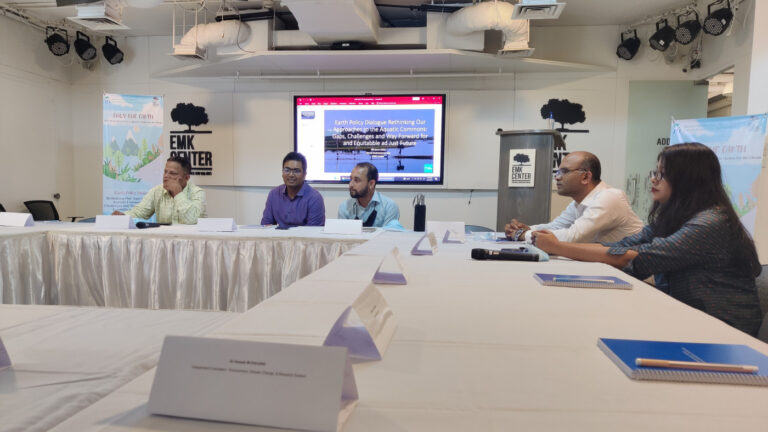
The dialogue was organised on the eve of the World Environment Day 2022 and World Oceans Day 2022, ahead of the UN Ocean Conference 2022 from 26 June to 1 July in partnership with EMK Center and the Catalyzing Sustainable Transformation (CaST) Network.
Dr Tanvir Hossain Chowdhury, deputy chief from the Department of Fisheries, along with members of the academia and civil society and think-tank representatives from various institutions and youths, attended the dialogue. The dialogue highlighted some of the key issues related to the management and conserving fisheries in the Haor (wetlands), coastal, and river basins. Read more at https://www.tbsnews.net/bangladesh/govt-needs-prioritise-equity-and-justice-sustainable-management-open-water-fishing-434098.
National Youth Consultation on Mainstreaming of biodiversity in agriculture in light of target 10 of KMGBF
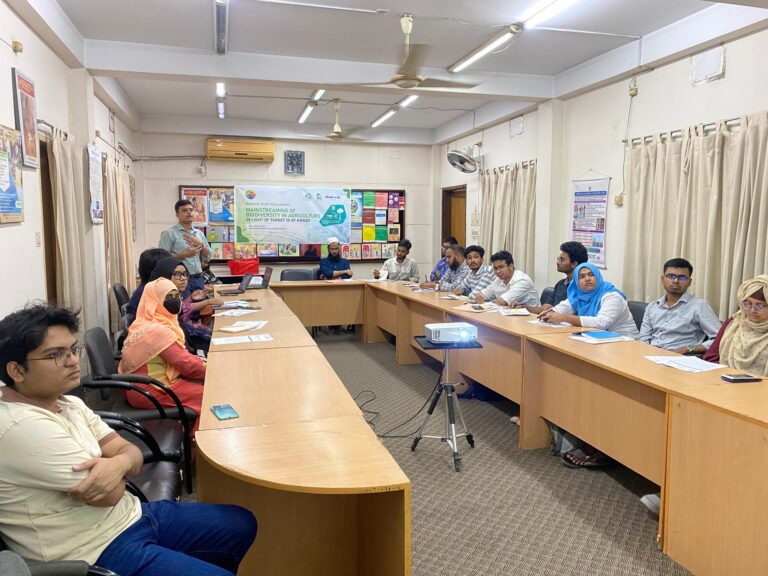
On 3rd May 2025 The Global Youth Biodiversity Network, Bangladesh in partnership with the Bangladesh Youth Environmental Initiative (BYEI) has organized a consultative workshop with youth environmental leaders from civil society, NGOs, and the government to discuss Target 10 of the Global Biodiversity Framework (GBF) and how it can be achieved nationally and mainstream biodiversity in agriculture.
Reconnecting Urban Sphere With Nature
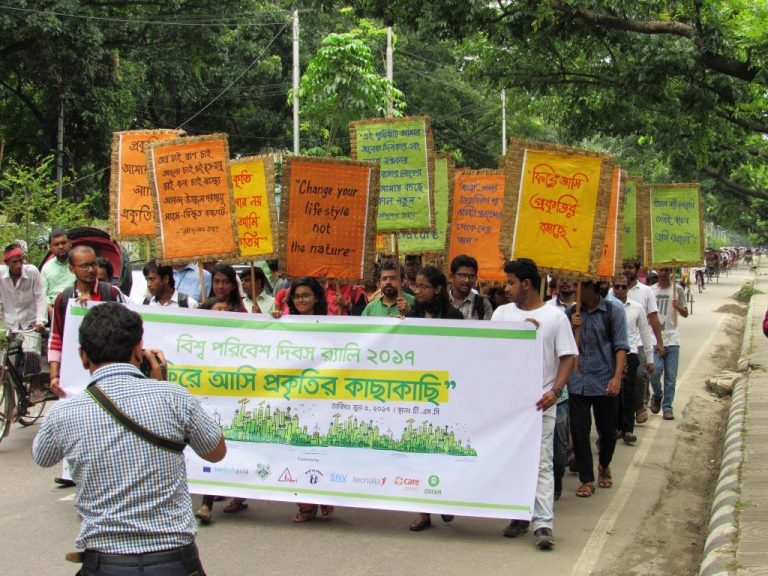
To celebrate the World Environment Day 2017 on the theme “Connecting people with nature”, Bangladesh Youth Environmental Initiative (BYEI) collaborated with Centre for Climate Change and Environmental Research (C3ER) and Oxfam Bangladesh to launch a Vision Contest: Reconnecting Urban Sphere with Nature.
The contest invited young people to send their visions on a future Green City, covering the question – “What is your dream or vision for an Eco-City? How can you make your city more connected to nature?” Submissions came from college and university students suggesting eco-friendly solutions which were presented to representatives from different National and International Development Organizations.
Bay of Bengal Ocean Literacy
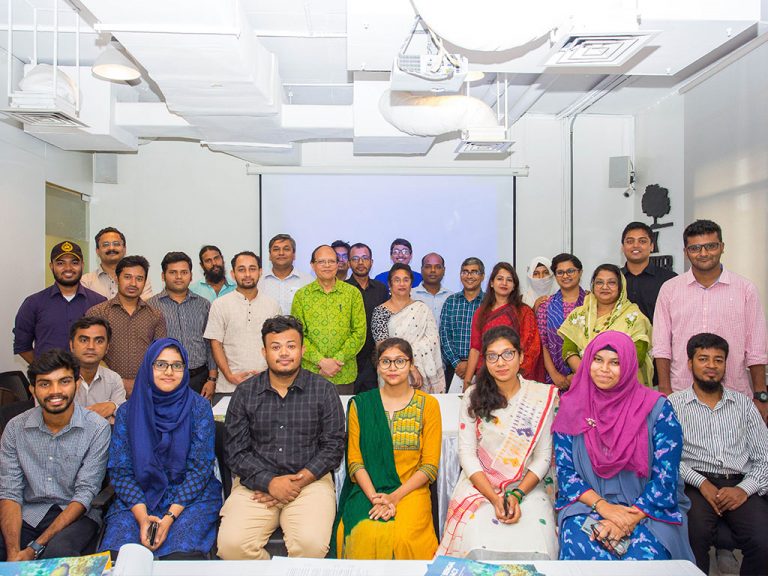
BYEI is one of the convening organisations of the Bay of Bengal Ocean Literacy Network. With the vision to create ocean literate citizenry, the Bay of Bengal Ocean Literacy Network has been launched to offer the educators and experts in all littoral countries of the Bay of Bengal a learning sharing platform on Ocean Literacy and Bay of Bengal Literacy.
The network is committed to facilitating knowledge-collaboration and capacity-building activities supported by the in-kind contributions of the members and other partners.
International Youth Environment Meet
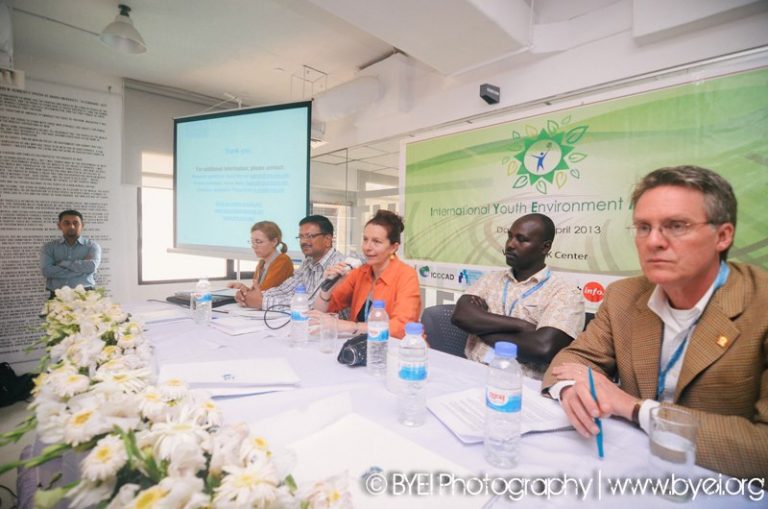
The International Youth Environmental Meet (IYEM) 2013 was a parallel event with the CBA7: 7th International Conference on Community-based Adaptation bringing 200+ global climate change experts and development professionals from across the world.
The day-long program entailed interactive presentations, lively panel discussion and Q&A sessions under three thematic sessions: Science of Climate Change, Community-based Adaptation, and Climate Change Mitigation. At the end of the IYEM conference, an International Committee on Climate Change (ICCC) was formed constituting the participants, speakers and BYEI leadership team to engage in joint efforts in climate change research and community projects under the auspices of the strategic and knowledge partners.
The International Institute for Environment and Development, Bangladesh Center for Advanced Studies, International Center for Climate Change and Development, and Center for Sustainable Development at University of Liberal Arts Bangladesh were the strategic and knowledge partners of IYEM 2013.
- Dr. Saleemul Huq, Director, International Center for Climate Change and Development & Senior Fellow at International Institute for Environment and Development, UK
- Dr. Pablo Suarez, Associate Director for Research and Innovation,The Red Cross / Red Crescent Climate Center
- Dr. Koko Warner, Head of the Environmental Migration, Social Vulnerability and Adaptation Section at the Institute of Environment and Human Security, United Nations University
- Mr. Kevin Henry, Project Coordinator, Where the Rains Falls, CARE France
- Ms. Saskia Daggett, International Coordinator, Africa Climate Change Resilience Alliance, Oxfam
- Ms. Daniela Tarizzo, Community-Based Adaptation and Monitoring & Evaluation Specialist, UNDP/UNV
- Mr. Christophe Buffet, EHESS -School for Advanced Studies in the Social Sciences, France
- Mr. John Nay, Fellow at Vanderbilt Institute for Energy and the Environment
South Asian Youth Environment Meet
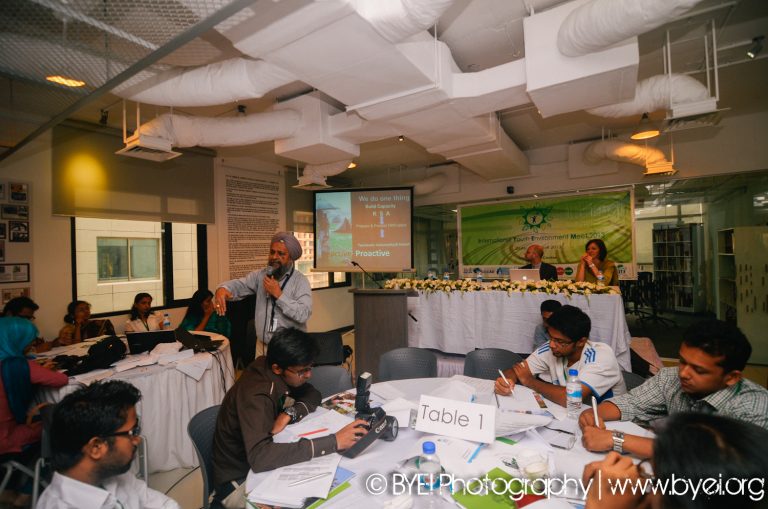
South Asian Youth Environment Meet (SAYEM) 2011 with the theme “Accelerating Sustainable Future for South Asia” was held on November 18-20, 2011. It convened some of the most brightest and talented young leaders from government, research organisations, NGOs, universities and from the development sectors, to discuss environmental challenges and potential solutions to the emerging issues pertaining to the region.
The aim was to ensure that youth voices are incorporated into environmental policy and planning, and also build the capacity and networks of youth environmental leaders. SAYEM 2011 concluded with Dhaka ‘Declaration – South Asian Youth Leaders’ Call to Action to Global Leaders at COP16’.
SAYEM 2011 was kindly supported by the U.S. Department of State and The American Center, U.S. Embassy, Dhaka and featured some of the leading experts.
- Mr. Saber H. Chowdhury, Chairman, All party Parliamentary Group on Environment and Climate Change, Bangladesh
- Dr. Saleemul Huq, Director, Senior Fellow at International Institute for Environment and Development, UK
- Dr. Peter Kim Streatfield, Director, Center for Population Urbanization and Climate Change, icddr,b
- Dr. M. Rezwan Khan, Vice Chancellor, United International University
- Dr. Nowshad Amin, Professor, The National University of Malaysia.
- Dr. Asif Nazrul, Professor, Department of Law, University of Dhaka
- Dr. Sadek Ahmed Khan, Climate Change Specialist, PKSF, Bangladesh
- Dr. Kazi Mizanur Rahman, Associate Professor, James P. Grant School of Public Health, BRAC University
